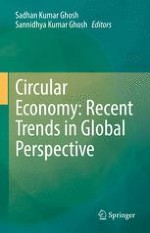2021 | OriginalPaper | Chapter
8. Perspective of CE in Russia: From Theory to Practice
Authors : Vladimir A. Maryev, Tatiana S. Smirnova
Published in: Circular Economy: Recent Trends in Global Perspective
Publisher: Springer Nature Singapore
Activate our intelligent search to find suitable subject content or patents.
Select sections of text to find matching patents with Artificial Intelligence. powered by
Select sections of text to find additional relevant content using AI-assisted search. powered by
